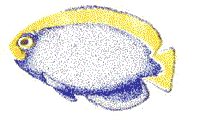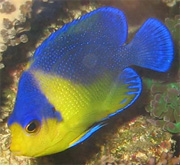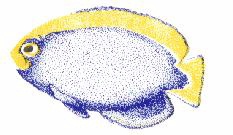|
Algae, An Introduction
By. Jim Wolf C.S.U.N. Marine Biologist
Pond scum, kelp, red tides, seaweed and "that film on the glass". These
are but a few of the many names that are used to describe the algae. These
are the plants of the sea. It is a huge assemblage of organisms with species
numbering in the tens of thousands. When asked exactly what is an algae,
many biologists are at a loss for words. They are so varied that they defy
a simple definition. These can be described as photosynthetic aquatic organisms
that lack any vascular (the conductive tissue in land plants) tissue, and
that the reproduce using spores (unlike most land plants that utilize flowers
for reproduction). They can be divided into two group based on their size.
The microscopic species are a critical component of plankton (free floating
organisms), and the macroscopic attached forms such as the familiar kelps
and pond scum. There are many exceptions to this scheme with some algae
having life cycles that involve both a macro and microscopic stages. There
are about ten groups of algae (called divisions). Three are uncommon, and
the remaing seven are covered briefly here:
CYANOPHYTES These are the primitive "Blue Green" algae. They are common
component of the small colonies of algae that encrust the surface of many
rocks on the coral reef. They are a type of photosynthesizing bacteria
and have the crucial role of "nitrogen fixing". They can take nitrogen
from the atmosphere and convert it into nitrates for use by other organisms.
EUGLENOPHYTES These are the bizarre Euglenoids. They possess an eye
spot and are very mobile. They are common in fresh water, and can be thought
of as a sort of plant / animal cross.
CHRYSOPHYTES This is a HUGE group with the Diatoms being the most familiar.
They live in bodies made of glass (silicone dioxide) and they are often
the first algae to colonize a new salt water aquarium. They appear as a
fine brown film on all the surfaces in the aquarium.
PYRRHOPHYTES. These are the Dinoflaggelates. They are primarily marine,
and are a quite complex unicellular algae. Dinoflaggelates are organisms
that are responsible for some bioluminescence (the green glow of light
you can see in some tropical oceans on a dark night) as well as the menacing
red tides.
CHLOROPHYTES The green algae and have members both large and small.
They are a critical component of a well established reef aquarium. Some
common genera include: Caulerpa, Halimeda (Beavertail Cactus), and Valonia
(Sea Grapes).
RHODOPHYTA These red algae actually come in many colors! It is a very
diverse group having the greatest number of s number of species of the
macroscopic algae. Botryocladia (Red Sea Grapes) and Porphyra (a crucial
part of any Sushi handrole) are some familiar examples.
PHAEOPHYTA These are the brown algae. They are the pinnacle of algae
evolution and include the massive kelps (i.e. Macrocyctis), which can attain
growth rates in excess of two feet per day! Southern California coastal
waters often contain vast forests of these algae and they serve as both
an extensive food source as well as safe haven for countless species of
marine organisms.
|











